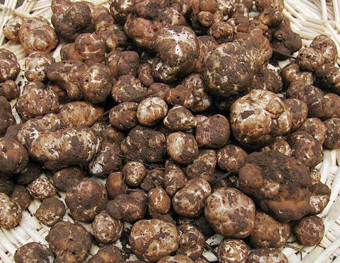
Image courtesy of Indiana Public Media
The Joy of Truffles
By Earl H. Perkins | published Monday, December 16, 2013 |
Thursday Review Associate Editor
I'm going to quit my job, move to Italy and become filthy rich—and you can too.
They call them white gold, and my accountant says I should be able to survive the whole year by selling one, maybe two. That's right. Two white truffles in Alba, Italy, recently fetched $120,000 at auction, according to the Tampa Bay Times.
How hard can it be? I figure maybe slam a couple trees in the ground, mix up a little compost and dirt, and hope for the best. The biggest problem is that I probably won't have much to write off my taxes, so I'll be in the highest tax bracket. What a terrible position.
Some of my research says you might not even need fertilizer, maybe just a little lime. All I need is for the County Extension office to test my soil, and I should be in good shape. Apparently in my particular Florida county, they'll give me a free soil analysis, so I'm already saving money. Get me a couple natural predators and some mild insecticide, and I'll be rolling in the dough. Approximately eight years after I plant my first trees, the production levels should reach 50 to 75 pounds per year. Also, I'm not real greedy, so you might want to buy me out before I start making the truly big money.
My truffle consultants have strongly recommended I begin with the Black Perigord or the Black Burgundy, but I figure even a few ounces of the whites will be enough to pay for everything I could ever want. I'll need a high-density orchard with around 500 trees per acre.
Truffles are a type of fungus that attach themselves to tree roots in a symbiotic relationship, which is absolutely necessary for them to survive. They are a member of the genus tuber, which means that they prefer to grow under organic litter such as leaves and fallen bark. The fungus, roots and other organisms form a structure known as a mycorrhiza.
I plan on acquiring truffle hunting dogs, so I can hunt truffles in the wild while growing others back at the farm. That's right: I'll train a few of those beagles, and turn them loose. The professionals swear by special hog smellers, but those darn things will eat up all the profits. Dogs are slow learners, but I would rather take a chance on a slow-witted dog than a talented truffle-sniffing hog. They have a keen sense of smell and almost always go straight for the truffles, but then boom, the fungus is history.
And I can hardly wait to get in on the ground floor of this incredibly historic and rewarding career. They were called something else at the time, but history's first reference to truffles appeared among inscriptions of the neo-Sumerians (Third Dynasty of Ur, 20th century BCE) regarding their Amorite enemy's eating habits. Fourth century BC writings concerning the subject were attributed to Theophrastus. Later, Plutarch and others considered them the result of lightning, warmth and water in the soil. The ancient Romans were actually the first to coin the term truffle. Over the centuries, the most diabolically skilled Europeans chefs developed recipes and even entire gourmet meals around the truffle, using its gratings and scrapings to flavor chicken, lamb, fish, veal, omelettes, souffles, and even pasta and rice. Truffles can also be crushed into a thin powder and mixed with olive oil for use on salads or as a seasoning in small drops.
Truffle harvests in Europe have been declining over the last 100 years since the record haul in 1890 of over 2200 tons. Harvests in recent years have dropped to as low as 25 tons, further driving up the price and narrowing their consumption to the super rich. However, Oregon truffles (despite the name, they also grow in northern California) are on the rise and have become not only popular, but also highly regarded by the truffle experts and even a few of the most persickety chefs.
If these musing haven't whetted your appetite enough to purchase my truffle interests, then I have another scenario for you. If you can't afford to quit your job and move to Italy, you might want to catch an airline flight to Florida. A man down there has set up a stand at the St. Petersburg Saturday Morning Market, and he's selling them hand over fist. Hurry, or they'll all be gone.
